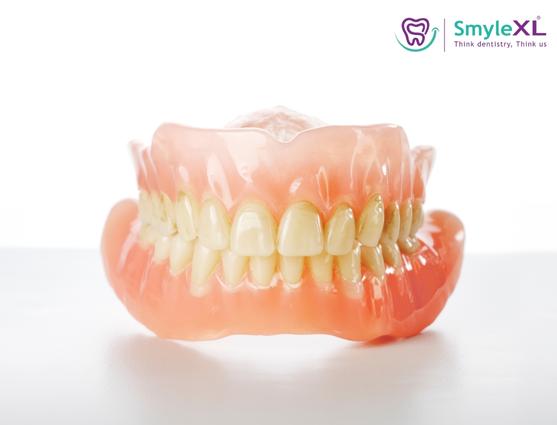DENTURES
DENTURES

Dentures are removable appliances which are used as a replacement of missing teeth and tissues. They are the artificial teeth which enable normal functioning of human mouth.
Complete Dentures fit over the upper teeth and roof and on the lower teeth placed like a horseshoe. They are conventional dentures and are removed during the night for cleaning.
Partial Dentures consists of replaced missing teeth attached to artificial gum connected by a metal framework which helps to hold the denture in place. Missing teeth can change the position of other teeth hence partial denture help to overcome this problem and keep the teeth intact.
Dentures are made of porcelain and acrylic resin.
Porcelain dentures look more natural and match easily with the remaining teeth. But porcelain, if dropped, will break easily and can wear down the remaining teeth hence, are better used as complete dentures rather than partial.
Acrylic resin dentures, on the other hand, are light in weight and easy to adjust. They fit properly and make the jaw movement smoother.
Step 1
The doctor will first take the impressions of your jaw to analyze how well they relate to one another and whether they have spaces in between them.
Step 2
A wax model is then prepared to check the fitting.
Step 3
Final Denture is made with the wax model
Step 4
The patient is made to try the final set of dentures and if necessary adjustments will be made
Keep Your Dentures Clean
Always ensure that your dentures are clean for this you need to brush your dentures with a non-abrasive brush at least once a day. Though they are artificial, yet plaque and bacteria can build up on the teeth causing damage to other teeth and gums. If possible remove your dentures after every meal and wash it with warm water but if you have complete dentures, then mere brushing would do.
Overnight Protection
Soak your dentures at night in water or in the denture solution as prescribed by your dentist. So that your dentures do not weaken avoid chlorine with it. While putting dentures on in the morning make sure you rinse them with clean water as this will help to remove the chemicals if any during the soaking process.
Keep A Look At Your Dentures
Monitor your dentures time to time and visit your dentist if your dentures loosen, slip or you come across a change in the bite. Having ill-fitting dentures can cause infections and irritations.
DO’S
Q.1. Why Is It Important To Remove Dentures At Night?
In order to allow gums and bones to relax at night time, removing denture is advised by dentists. Removing bottom or top dentures also allow the gum to come in contact with saliva considered good for the oral health of an individual. Get all the necessary information about dentures at your nearest Smylexl Dental clinic.
Q.2. Can One Sleep With Dentures On?
Yes, one can sleep with dentures on. But, for best results and good oral health, it is advised by dentists to remove dentures before sleeping to give space for bones and gums to relax. Since dentures cost a good sum of money, taking good care of them is important.
Q.3. Do Dentures Hurt?
No, dentures do not hurt at all. It is only at the beginning that patients may feel a little discomfort or uneasiness as they are not used to custom dentures in the mouth.